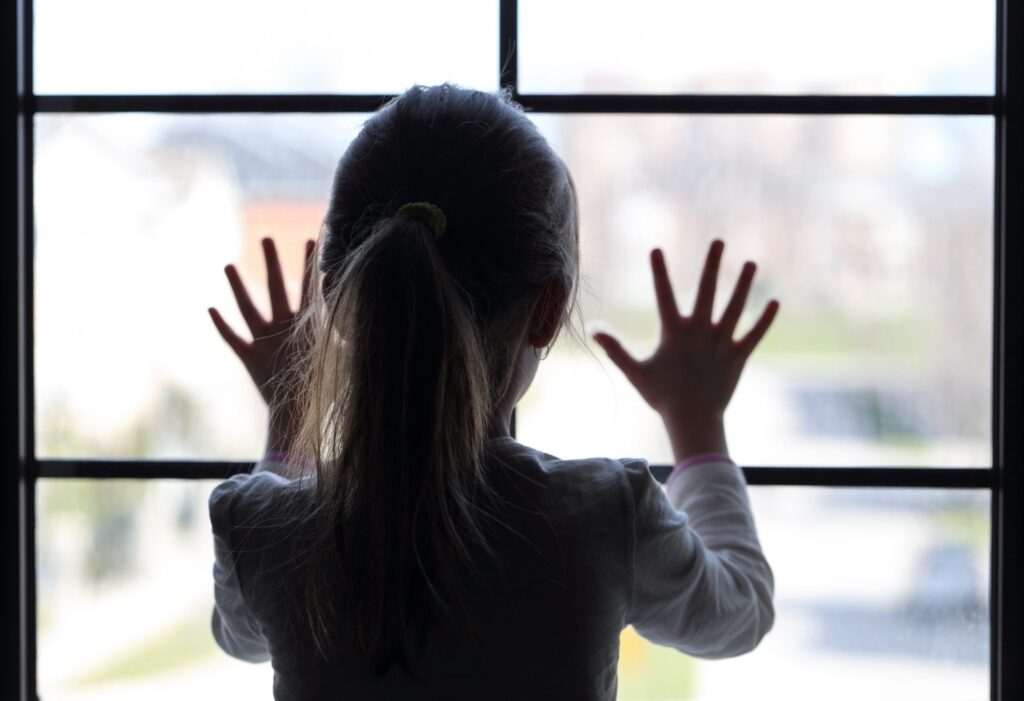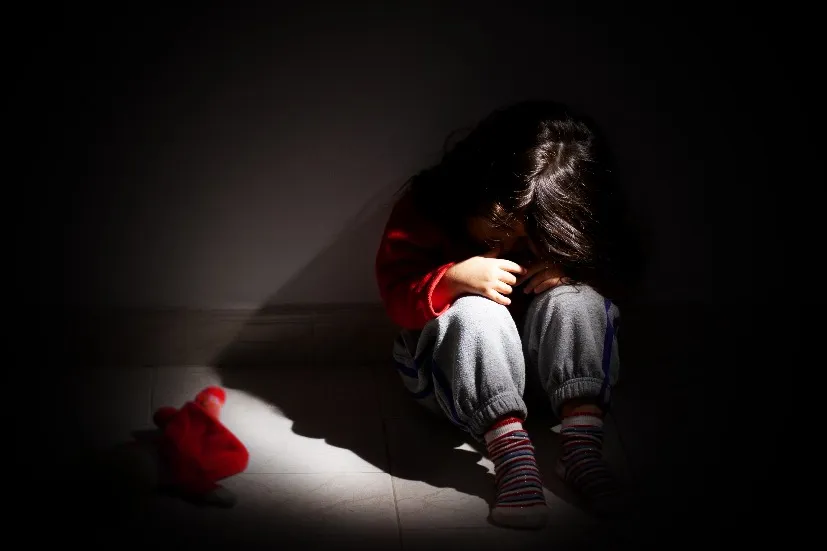In a heart-wrenching revelation, child sex abuse has silently infiltrated Kashmir, revealing the vulnerability of innocent minors to unspeakable cruelty. Recent distressing incidents in various districts of Jammu and Kashmir have exposed a grim reality that demands immediate attention.
By Tauheed Ahmad
Child sex abuse has silently infiltrated Kashmir, shattering its tranquility and laying bare a harrowing truth. Innocent minors, robbed of their innocence, endure unspeakable cruelty from the very individuals they should trust. This grim reality has come to light through a series of distressing incidents in Srinagar and Baramulla districts in the month of June this year. Trusted figures, including teachers and relatives, have turned into tormentors, subjecting young victims to unspeakable cruelty. Silent Horror
Pertinently, in a chilling incident that unfolded on 29 August 2023 in the heart of downtown Srinagar, Jammu and Kashmir, the local police have taken swift action against a mosque Imaam suspected of committing a heinous crime. The individual in question, identified as Waseem Raja and hailing from Noorbagh, stands accused of an alleged unnatural sex offense involving a nine-year-old child. The confirmation came from Srinagar police on its twitter handle.
Waseem Raja, the son of Ali Mohd Malla, held a position of local masjid as the Imaam responsible for leading prayers at Masjid Aisha Malikaagun. This shocking revelation has sent shockwaves through the community, highlighting the urgent need for vigilance and measures to protect vulnerable children.
In response to this disturbing incident, the authorities have taken immediate action. The J&K Police have initiated a case under the relevant sections of the Indian Penal Code (IPC) and the Protection of Children from Sexual Offences Act (POCSO). The case has been registered at the Maharaj Gunj police station, indicating a strong determination to address the issue and bring the accused to justice.

This incident serves as a stark reminder that child sexual abuse is a pressing concern that requires unwavering attention. It underscores the importance of creating a safe environment for children and the urgency of comprehensive measures to prevent such horrific incidents from occurring in the future.
The grim toll is evident in a stark 52% rise in reported child sexual abuse cases in Kashmir by November 2020, a surge attributed to legal changes and improved monitoring.
The central government’s extension of the Child Protection Services Scheme to Jammu and Kashmir post the 2018 Kathua case reflects a dedicated effort to shield the next generation from abuse.
In the aftermath of the Article 370 annulment in 2019, legal shifts brought forth the POCSO (Amendment) Act, 2019, replacing the Jammu and Kashmir POCSO Act. This change, alongside the introduction of the new Jammu and Kashmir POCS Act in 2018, led to a significant rise in reported cases.
The establishment of specialized POCSO courts streamlined case management and resolution timelines. Disturbingly, reported child sexual abuse cases in the Kashmir division surged over 350%, from 30-35 cases in 2015-2018 to a staggering 162 cases in 2019, underlining the urgency to combat this alarming trend.
Empowered by improved monitoring and tracking, victims are coming forward, exposing the dark reality that persisted due to past barriers. Yet, despite increased reporting, a culture of silence remains, especially when family members are involved
The pandemic-induced lock-downs further exacerbated the problem, creating an environment conducive to abuse within Kashmir’s constrained social structure.
A 2007 survey by the Ministry of Women and Child Development laid bare the prevalence of sexual abuse, with over half of the surveyed children experiencing abuse, often by individuals known to them or in positions of trust. This pervasive silence has prevented many victims from reporting the abuse they endure. Child abuse, now thrust into the spotlight, is no longer confined to silence.
Child abuse, though a longstanding societal issue, has found itself thrust into the spotlight. The Covid-19 lockdown, while just a chapter in this narrative, laid bare the vulnerability of children to a spectrum of abuses.
Confined to their homes, children faced emotional, physical, and horrifying maltreatment, often stemming from their caregivers’ frustration. However, this served as a mere prelude to an even more disturbing reality that transcends lockdowns.
Surge in Child Sexual Abuse Shakes Kashmir
Expert Perspectives:
Dr. Wasim Kakroo, a Clinical Psychologist:
Delving into the unsettling details of this issue, a senior Clinical Psychologist Dr. Wasim Kakroo, consultant Clinical Psychologist (RCI) with years of experience in treating trauma and abuse cases, emphasized the grave concern posed by the emergence of pedophiles amidst this distress, another malevolent force emerged – pedophiles.
Defining the psychological tactics adapted by these pedophiles, Dr. Wasim, a renowned psychologist specializing in child trauma, emphasized, “Their calculated tactics preyed upon the prepubescent children who were now confined alongside them. This dark reality was marked by the disheartening fact that these children had no escape. The lockdown served as a backdrop, and pedophiles seized upon the opportunity to inflict their atrocities, ensnaring their victims in a vicious cycle of abuse.” Dr. Wasim’s insights shed light on the disturbing methods these predators employ to exploit vulnerable children in their proximity.

Highlighting the concerning accessibility of children within the societal structure, Dr. Wasim provides insights into the tactics exploited by pedophiles. He underscores the link between easy access and increased victimization, as well as the distressing frequency of these cases that magnifies the severity of the issue.
“The accessibility of children within the societal fabric became a factor exploited by pedophiles. The easier the access, the higher the likelihood of victimization. The disturbing frequency of these cases underscored the gravity of the situation – children were trapped not only within their homes but also within a cycle of exploitation, driven by predators who saw them as easy targets”, he said.
A Glimpse into Tactics and Measures to Protect Vulnerable Children
However, amidst the shadows emerged a glimmer of hope as observed by Dr. Wasim, he noted that certain mental health campaigns, strategically launched during the lockdown, cast a powerful light on the prevailing darkness. These impactful initiatives, as he pointed out, played a crucial role in empowering survivors to break free from the suffocating silence that had long concealed the gravity of this issue.
Dr. Wasim highlighted that the result was a remarkable increase in the reporting of child abuse cases, offering not only the promise of justice but also the opportunity for much-needed healing to those affected.
Reflecting on the issue, Dr. Wasim pointed out, “Child abuse, as we tragically know, is not a new phenomenon. It is a long-standing stain on society, perpetuated by societal taboos and fears that deter victims from breaking their silence. This, in turn, fosters a culture of silence that further entrenches the problem. What makes matters worse is the unsettling proximity of perpetrators to victims. This blurred boundary of trust creates a power dynamic that only perpetuates the cycle of silence.”
A Calculated Game: Intimate Knowledge Empowers Predators
In a striking revelation, Dr. Wasim highlighted that the majority of perpetrators are not strangers; rather, they are individuals known to the victim. This familiarity, he emphasized, gives these wrongdoers a deep understanding of the victim’s vulnerabilities, which they exploit to manipulate and gain control.
He described this disturbing scenario as a calculated game, where an intimate knowledge of the victim’s psychology affords these predators an unsettling upper hand.
Continuing his analysis, Dr. Wasim delved into the unsettling tactics utilized by pedophiles. He explained, “The grooming process employed by pedophiles is a deeply disturbing facet. It involves building trust and depicting themselves as confidants who alone comprehend the victim’s struggles”.
This emotional manipulation lays the foundation for a treacherous trap. Gradually, they push boundaries, often beginning with inappropriate touches to gauge reactions. This is where the importance of early education becomes evident – arming children with the knowledge to differentiate between safe and dangerous touches, he added.
Addressing preventive measures, Dr. Wasim emphasized, “Equally important is creating an environment where victims can speak out without shame. The normalization of reporting is crucial to break the cycle of silence that perpetrators rely on. Often, as victims become ensnared, they find themselves trapped without realizing it, as predators work meticulously to normalize their actions”.
Dr. Wasim highlighted the grim climax of this sinister saga, explaining, “In the final act of this malevolent play, predators resort to a particularly harrowing tactic – blackmail. They exploit incriminating evidence to silence their victims, exacerbating their suffering. Regrettably, the lack of societal support amplifies their agony, serving as a deterrent to seeking assistance. Shockingly, many of these wrongdoers are not strangers; they frequently hold positions of trust, including family members, relatives, friends, and even parents.”

Emphasized the distressing predicament faced by victims in a society where the perpetrators are often familiar figures. Dr. Wasim pointed out, “In a society where the perpetrator is often known, victims grapple with a painful dilemma. Whether male or female, they are coerced into silence, bearing the weight of their ordeal alone”.
The urgency lies in breaking these chains, amplifying victims’ voices, and holding perpetrators accountable, regardless of their relationship to the victim. Only through collective action can we dismantle the grip of child abuse, exposing the cold-blooded psychopaths hidden amongst us, he added.
“Child sex abusers display psychopathic tendencies and require treatment. Their cold-blooded actions and calculated targeting signify psychopathy. Victims often succumb to their manipulation due to pressure and fear, whether they’re children or adults. The methodical nature of their traps is alarming; with some pedophiles gaining so much power that no one dares speak against them. Cases have even been identified within religious places, a deeply disturbing reality” he said.
Unveiling Psychological Stressors:
Illuminating the complex psychological stressors at the core of child abuse, Dr. Wasim highlights child abuse as a grave concern; that reaches across genders demanding holistic psychological intervention for both victims and perpetrators.
“It’s important to acknowledge that genetic tendencies toward certain genders exist within our society, and similarly, pedophiles exhibit distinct inclinations. These perpetrators are not confined by gender, as females can also perpetrate these heinous acts. Recognizing this, rehabilitation is essential to prevent the repetition of abuse cycles” he said.
Dr. Wasim sheds light on the significance of psychological intervention in addressing this issue. He emphasizes that while legal measures can certainly hold perpetrators accountable, the true solution to preventing the recurrence of such offenses lies in rehabilitation.
According to Dr. Wasim, psychological intervention possesses the transformative power to guide individuals away from destructive paths. Pedophiles, with their obsessive attraction to prepubescent children, can emerge from various backgrounds, including educators, relatives, neighbors, or even within the family dynamic.
”To address their urges, understanding their impulses and aiding impulse control becomes pivotal, as these desires are compulsive and challenging to control” he said.
He draws a parallel to compulsive shopping, explaining that just like individuals can be driven by uncontrollable urges to shop despite knowing the consequences, pedophiles similarly struggle to control their impulses.
Dr. Wasim also underlines the necessity of rehabilitation to prevent potential harm to children in the future. He points out that relying solely on legal measures is insufficient; instead, psychosocial rehabilitation is imperative.
“In some cases, patients with borderline personality disorders, who were victims of child sex abuse during their own childhood, can experience emotional dysregulation that significantly impacts their lives” he said
He also warns that if not addressed, this pattern of trauma can escalate into dangerous behaviors in adulthood.
While underscoring the need for sensitivity when reporting child abuse incidents, he said that reporting child abuse incidents mandates sensitivity. Whether by police, journalists, media channels, or doctors, preserving the victim’s identity and details is essential to prevent future societal stigma.
Awareness is a pressing need in society. Child abuse is an escalating issue, often shrouded in silence due to societal discomfort. Incorporating comprehensive mental health education into the curriculum is an urgent necessity. European countries have set an example by dedicating curriculum space to children’s mental health, fostering an environment where important life lessons can be imparted. Policymakers should consider this, creating a safe space for children to discuss their concerns without hesitation.
Dr. Wasim underscores the crucial role parents play in protecting children from abuse. He highlights the importance of vigilance, open communication, and addressing sensitive topics to empower children. According to him, parents must overcome psychological barriers to discuss self-protection, even in various settings like school or society.
Dr. Wasim emphasizes the need for a comprehensive approach to tackle child abuse, calling it a societal issue. He advocates for the rehabilitation of perpetrators, mental health education in schools, and open dialogues involving parents, educators, and children. According to him, this collective effort is crucial to prevent abuse and ensure the well-being of survivors, safeguarding the future of our children.
Addressing this critical issue necessitates a multi-faceted approach. Society must recognize individuals with deviant tendencies and adopt measures to curtail their actions. Educating children about potential abuse, perverts, and self-protection is vital. Stringent mechanisms should be employed to identify those with bad behavioral traits and criminal records, especially in positions of authority like Imams, he said.
Experts emphasize the need for tough penalties and societal unity to punish wrongdoers and prevent their escape. Victims of child sexual abuse require vital support, counseling, and societal care to navigate the psychological aftermath. The media plays a key role in spreading awareness and combating stigma surrounding pedophilia. While complete prevention may be difficult, a united effort from society, law enforcement, and the media can greatly reduce these crimes and protect our children’s innocence and future.
Paradigm Shift in Kashmir Society
Dr. Basarat Hassan, an Anthropologist
In a comprehensive examination of the changing landscape of family structures and their intersection with cultural shifts, Dr. Basarat Hassan, a distinguished cultural anthropologist from Jawaharlal Nehru University (JNU), highlights the profound alterations in family dynamics brought about by technological advancements and evolving media representations. Dr. Hassan’s insightful analysis also delves into the concerning issue of child sex abuse, framing it within the broader context of culture and societal change.
The transformation of family interactions from traditional upbringing to the integration of telephonic conversations and digital media has not only altered communication patterns but has also become an integral aspect of modern family dynamics.
“Television programs, media discourse, and cinematic narratives have evolved alongside these shifts, playing a role in shaping contemporary familial relationships”, he said.
As Kashmir grapples with these profound societal shifts, Dr. Basarat Hassan’s insights provide a comprehensive understanding of the intricate interplay between changing family dynamics, media influences, cultural transformations, and the resulting social challenges.
Dr. Hassan brings attention to the disturbing reality of child sex abuse, asserting that its occurrence is embedded in the phenomenon of culture itself rather than being solely a social concern. He said that this is due to the ongoing transitional shift within society, facilitated by various means. This perspective underscores the necessity for a comprehensive understanding and response to the issue.
In a poignant observation, Dr. Hassan highlights a significant shift in adolescent behavior over the past few decades.
“Once characterized by a distinct age range for the emergence of sexual urges, contemporary society witnesses these urges appearing earlier and more pronounced among adolescents. This trend has led to a troubling phenomenon where young children engage in relationships prematurely, viewing this behavior as normative despite its potential consequences”, he said.
Dr. Hassan’s expertise extends to examining the multifaceted nature of societal dynamics. From an anthropological viewpoint, he emphasizes the need to consider industrial, political, and market-driven factors when discussing social changes. He specifically addresses the unique context of Kashmir, where issues such as child abuse and drug abuse cannot be isolated from the broader cultural and socio-economic landscape. Dr. Hassan advocates for a holistic understanding that transcends simplified analyses.
The clash between industrialization and traditional Kashmiri values is also explored, with Dr. Hassan suggesting that this “sandwich phenomenon” results in a cultural conflict that contributes to various societal issues, including child abuse.
Driven by the demands of industrialization, children face extreme pressures from multiple sources—peer groups, academics, family, and society—making them susceptible to victimization due to their tender age and lack of moral judgment, he said.
Dr. Basarat Hassan’s comprehensive analysis provides valuable insights into the intricate interplay between evolving family structures, media influences, cultural shifts, and the complex factors contributing to contemporary challenges. As society continues to evolve, his expertise underscores the necessity for a nuanced understanding that considers the broader socio-cultural landscape.
Kashmir is currently experiencing a profound transformation in its societal landscape, marked by recent events that reveal a host of previously unheard-of issues in the region. Dr. Basarat Hassan undertakes an exhaustive exploration of this societal metamorphosis.
Delving into the emergence of previously unfamiliar terms like “rape” in historical discussions and the deeply troubling occurrences of children perpetrating harm against their mothers. Dr. Hassan also considers the broader societal restructuring underlying these events.
“The term “rape,” which was rarely uttered just a decade or two ago, has now become an integral part of Kashmiri societal discourse. Recent incidents, including horrifying cases of children committing unthinkable acts against their own mothers, have sent shockwaves through the community”, he said.
Drawing from the realm of anthropology and cultural analysis, Dr. Hassan suggests that these unsettling events are indicative of an accentuated societal structure. Significant structural changes in society tend to be accompanied by such deviations.
“To find the primary root cause behind these incidents, it lies in sociological imbalances and social isolation experienced by the perpetrators. Many of these individuals, having themselves been victims during their own childhoods, find themselves adrift without the moorings of societal values”, he said.
Paradoxically, they turn to deviant behavior as a form of conformity, seeking acceptance through unconventional means. The deprivation of essential elements during their upbringing plays a critical role, profoundly affecting their psyche and driving them towards deviant actions, he added.

Underscoring the importance of balanced childhood with significantly reducing the likelihood of engaging in such aberrant behavior, Dr. Hassan said that disturbingly, many of the perpetrators are individuals closely related to the victims, a proximity that often emboldens them to exploit their victims, confident that their crimes will remain hidden.
While Kashmiri society had long maintained a state of denial regarding these unsettling developments, there is now a growing acknowledgment of the stark reality that such incidents do occur. Cases of illegal sex rackets, once dismissed, have come to light. This can be attributed, in part, to the societal clash with industrialization. Confronting these issues head-on is paramount, as they have long remained concealed beneath the surface, he said.
The proliferation of new media and social media has significantly contributed to the sexualization of society, transforming it into a highly consumer-oriented entity. The ready availability of explicit content, including adult and sexual material, has generated a societal desire for an outlet, he added.
“Within the context of Kashmir, the surge in young children entering relationships can be attributed to their exposure to highly sexualized content, resulting in heightened sexual drive and obsession,” he said.
Furthermore, there has been a notable shift in sexual orientation among adolescents. Even at an early age, the pursuit of boyfriends or girlfriends, often intertwined with sexual motives, has gained traction. The acceptance of such relationships remains a subject of debate in Kashmir, but their prevalence is undeniable, he informed.
“During early childhood, typically between the ages of 7 and 11, personal identities take shape. Emotional trauma during this formative period can have long-lasting consequences, often leading to specific behaviors and a sense of vengeance in affected individuals”, he said.

Leave a Reply